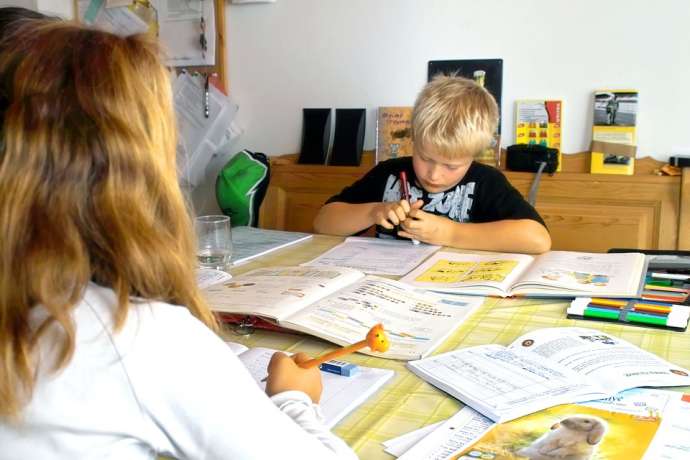Časoris is an online newspaper aimed at children. Each week we’ll take an article and post it here as a Slovene-English dual text.
Kako pomagati otrokom v času epidemije?
How to help children during an epidemic?
Written by Sonja Merljak Zdovc, translated by JL Flanner & G Translate
Učitelji in starši se vse pogosteje sprašujejo, kako trenutne razmere doživljate otroci in kaj te pomenijo za njihovo nadaljnje življenje.
Teachers and parents are increasingly wondering how children currently experience the current situation and what it means for their future lives.
Kakšne posledice bodo epidemija in ukrepi za njeno zajezitev pustili na otrocih? Jasnih odgovorov še ni, pravi strokovnjakinja dr. Mojca Juriševič s pedagoške fakultete.
What marks will the epidemic and measures to contain it leave on children? There are no clear answers yet, says expert Dr. Mojca Juriševič from the Faculty of Education.
Vemo pa, da ste mnogi v stiski.
But we know that many of you are in need.
Staršem in učiteljem je svetovala, kako naj pomagajo, da se boste lažje spopadli z negotovimi razmerami.
She advised parents and teachers on how to help cope with the precarious situation.
Za zdrav razvoj otroci potrebujete občutek varnosti, povezanosti in zaupanja pa tudi občutek, da zmorete in da lahko aktivno prispevate, pravi strokovnjakinja.
For healthy development, children need a sense of security, connection and trust, as well as a sense that they can actively contribute, says the expert.
Te občutke in izkušnje pridobivate doma, krepite jih v odnosih s prijatelji in sošolci, a tudi v šoli.
You gain these feelings and experiences at home, strengthen them in relationships with friends and classmates, but also at school.
Šola je namreč okolje, ki prepoznava in spodbuja vaše interese, vabi k usvajanju znanja, uči, kako se spoprijeti z ovirami, in navaja na učenje, delo in sobivanje.
The school is an environment that recognises and promotes your interests, invites you to acquire knowledge, teaches you how to deal with obstacles, and teaches you to learn, work and love together.
»Iz prvega vala epidemije vemo, da so otroci upoštevali ukrepe za preprečevanje širjenja okužbe in se trudili opravljati šolsko delo v izjemnih razmerah. A ko sta se vrtec in šola prenesla na dom, so začeli pogrešati vrstnike, učitelje in šolski vsakdan. Večinoma so se izredni situaciji uspeli prilagoditi; kako dobro, je bilo odvisno od njihovih družin in konkretne podpore šol. Otroci s posebnimi potrebami in tisti iz družin z različnimi težavami pa so v tem času doživljali hude stiske.«
“We know from the first wave of the epidemic that children took measures to prevent the spread of the infection and tried to do their schoolwork in exceptional circumstances. But as kindergarten and school moved into the home, they began to miss peers, teachers, and school every day. For the most part, they managed to adapt to the emergency situation; how well depended on their families and the concrete support of the schools. Children with special needs and those from families with various problems experienced severe hardships during this time. "
Kako lahko odrasli prispevamo k dobremu počutju otrok in mladostnikov v danih razmerah?
How can adults contribute to the well-being of children and adolescents in the given situation?
Nadvse pomembno je, da se pogovarjamo, pravi strokovnjakinja.
It is extremely important that we talk, says the expert.
»Vprašajmo jih, kako se počutijo, o čem razmišljajo, kaj jih skrbi. Odgovarjajmo na vprašanja in skupaj iščimo odgovore, ki so primerni njihovi starosti in stopnji razumevanja.«
“Let’s ask them how they feel, what they think, what worries them. Let's answer the questions and together we look for answers that are appropriate for their age and level of understanding. "
Korona naj ne bo v središču vsakdana, a ne sprenevedajmo se, a obenem se ne pretvarjajmo, da je vse normalno.
Corona should not be at the centre of everyday life, but at the same time we are not pretending that everything is normal.
»Ne stresajmo jeze in nezadovoljstva nad ukrepi pred otroke, delimo z njimi misli, pomisleke, čustva, ne igrajmo vloge superjunaka, ki mu nič ne pride do živega.«
"Let's not shake with anger and dissatisfaction with the restrictions in front of children, we can share thoughts, concerns, emotions with them, let's not play the role of a superhero whom nothing upsets."
Read more stories and improve your Slovene at Časoris, while all our dual texts can be found here.







